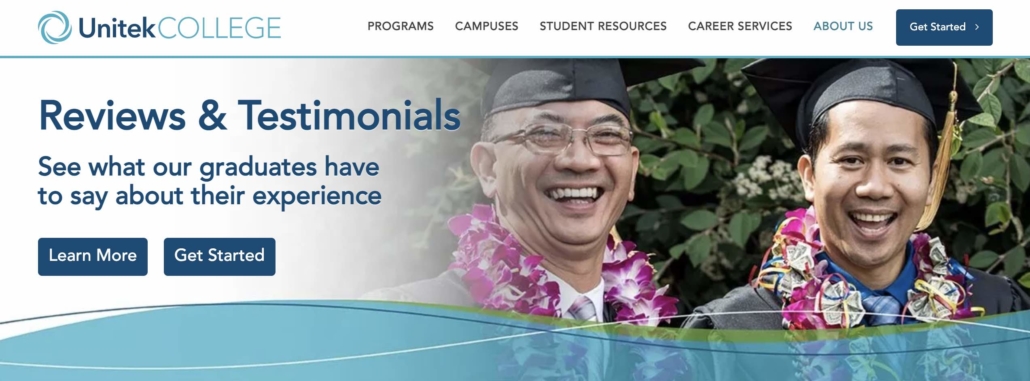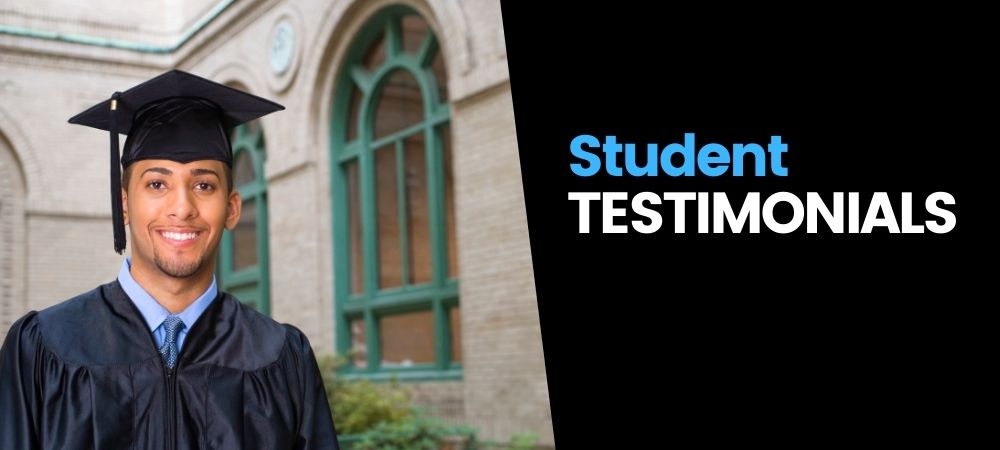While campus tours, program outlines, and interviews are important for equipping applicants with the information they need to make informed decisions, student testimonials help individuals forge a deeper understanding of what life is really like at your institution.
When leveraged to their full potential, student testimonials are valuable assets that can help you showcase your institution’s values, build trust and boost enrollments.
Why are testimonials so effective?
Simply put, testimonials are powerful because they build trust.
- People connect with first-hand testimonials and reviews on an emotional level.
- Testimonials naturally contain elements of storytelling. Stories prompt our brains to release dopamine, making us more likely to remember the content.
- Although an individual might not apply after watching a testimonial, they’ll remember your institution and might encourage a friend or family member to check it out.
Online testimonials and reviews are incredibly effective in the consumer landscape when it comes to decision-making. In 2021, 77% of consumers “always” or “regularly” read reviews when browsing for local businesses (up from 60% in 2020).
If word-of-mouth marketing is so influential for lower-value purchases, think about how valuable it is for those looking to invest in higher education.
Are written or recorded testimonials better?
Both have a role to play. Written testimonials are easy to collate and can be repurposed across different platforms. For instance, you can have the full testimonial sitting on the testimonials page on your website, and use shorter quotations from it on social media.
Video testimonials offer considerable value.
Video content is more memorable because it appeals to more of the senses. A video testimonial provides you with an opportunity to showcase footage of your campus and programs too.
How to source student testimonials
It’s a good idea to make the process of sourcing testimonials as simple as possible for both the person providing the testimonial and the individual facilitating it. The more complex the process, the more likely students will ignore or reject your invitation.
Platforms like VocalVideo make it easy to collect, record and edit video student testimonials. It’s used by organizations from different sectors, including education.
There are a variety of ways you can go about collecting testimonials:
Campus/online events
Homecoming is a great time for testimonial sourcing. Why not reach out to some alumni who will be attending this year’s homecoming and ask them to share a few memories?
The filming process doesn’t have to be technical and time-consuming. A smartphone will suffice. Use a phone to capture short clips and share them on social media. You could also capture video content from seminars and webinars, graduations and sporting events.
Testimonial outreach
Reach out directly to people whose experiences you might be interested in sharing with potential applicants. While not everyone will have the time or inclination to provide a video testimonial, they might be more than willing to leave a Google Review. Google Reviews help you build more credibility with people who are researching your college and they have SEO benefits too.
College website/socials
Consider creating a page on your website dedicated to testimonials, and provide a dedicated email address for submissions. You could also invite students to share their experience on social media by messaging you or commenting on posts.
Whatever you decide, always get permission before you share testimonials.
Where can you share student testimonials?
Get your student testimonials seen by as many prospective applicants as possible by sharing them across a variety of platforms. Let’s look how some of LeadSquared’s higher education customers are capitalizing on their student testimonials.
1. Social media
Asher College’s YouTube channel is full of testimonials from students and graduates. Instead of relying on one or two testimonials to do all the talking, like Asher, it’s important to showcase a wide variety of students that potential applicants can relate to.
Pittsburgh Career Institute is using TikTok to showcase the student experience. In this video, the college shares footage from the vet tech program, giving applicants an insight into what they can expect if they choose Pittsburgh as their institution of study.
Intellitec College demonstrates how TikTok content can be easily repurposed for Instagram. The college’s “I Got Hired” campaign demonstrates the different career paths graduates took after their studies finished.
2. Website
Visitors expect to see testimonials on your website. To capitalize on testimonials, think carefully about where to place them for maximum visibility.

Unitek, for example, has a page on its website dedicated to reviews and testimonials. The text is broken up by images of graduates, providing the visitor with further context.
Unitek’s reviews are short enough to keep the reader engaged, and cover all bases: from financial aid to career services.

The Modern College of Design has placed reviews on its homepage so they’re the first thing visitors encounter. The college has also included footage of its campus and some of its students’ designs to give the visitor richer insight into the college experience.
You can also feature testimonials on your program pages and alumni page.
Longer-form written testimonials also work well as blog posts. Why not run a series? You could get students to pen their own articles or ask a member of the team to interview them.
3. Landing pages
A landing page, if you didn’t already know, is a standalone web page that is usually created for a specific advertising or marketing campaign. It’s where the visitor “lands” when they follow a link on your social media channels or ad, for instance.
While normal website pages usually encourage the visitor to explore the site, landing pages have a single goal in mind and include a clear call to action. They’re often designed to encourage and increase conversions.
Could some of your student testimonials work well on a landing page? Before you publish your landing page, have a clear goal in mind. Think about what you want the visitor to do. Perhaps you want them to start an application, or sign up for an event?
4. Email marketing
Including student testimonials in your email workflow is another must. When a potential applicant first engages with your institution, if they opt in, they should then receive a series of messages to nurture them through the application process.
As part of this workflow, you could create an email containing testimonials. Remember to populate the email according to the subscribers’ needs. For instance, if they are a non-traditional applicant, consider sharing testimonials from a non-traditional student.
Wherever you publish your testimonials, be sure to capture any new inquiries securely, and in one place. With a higher education CRM like LeadSquared, you can capture inquiries from any channel and distribute them to the appropriate team member.
Look beyond your past and present students
While students and alumni are great ambassadors, they’re not the only ones.
Gathering testimonials from the people who work in your institution will help you attract talented new team members as well as new students.
People want to hear from a college’s faculty and staff before making a decision. Staff testimonials can help set the tone, boost credibility and demonstrate expectations. That’s why it’s important to give a range of departments a voice.
The quality of your college’s extracurricular activities may play a significant role in the decision-making process. Applicants want to know they can continue to pursue their passions alongside their studies, and be part of a supportive community.







![[webinar] tiktok for career schools: how to create viral content that connects 5 TikTok for Career Schools](https://www.leadsquared.com/wp-content/uploads/2022/04/Tiktok-for-career-schools-80x80.png)
